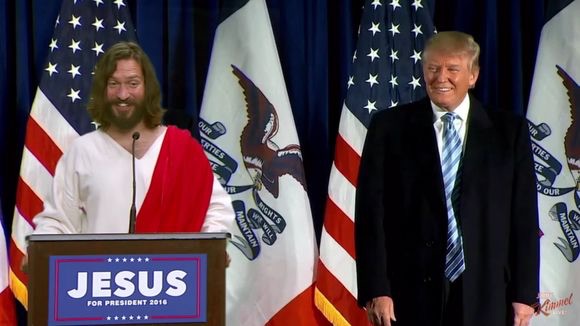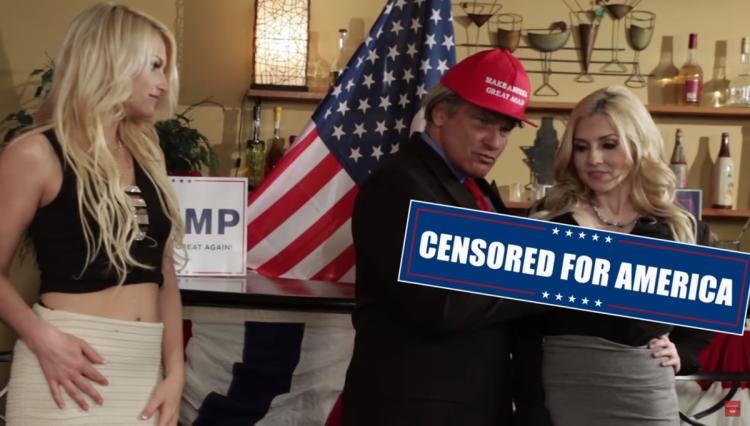Trump Hypnotizes Media While GOP Moves to "Terminate" Dept of Education & EPA, Destroy Unions & Punish Sanctuary Cities
GOP = The Most Dangerous Organization in Human History? Noam Chomsky explained, “on Nov. 8, the most powerful country in world history, which will set its stamp on what comes next, had an election. The outcome placed total control of the government—executive, Congress, the Supreme Court—in the hands of the Republican Party, which has become the most dangerous organization in world history.”
Chomsky admits “The last phrase may seem outlandish, even outrageous. But is it?” [MORE] and [MORE]

H.R. 899: To terminate the Department of Education. Racist suspect Rep. Thomas Massie, a Republican representing Kentucky's 4th District, introduced a bill to abolish the Department of Education. H.R. 899 calls simply for the “termination” of the Department of Education by the end of 2018. "The Department of Education shall terminate on December 31, 2018."
[Leaving It Up to the White Jesus' Return/'We are Separate from Nature'] H.R. 861: To terminate the Environmental Protection Agency. Introduced on 3 February 2017 by Rep. Matt Gaetz (R-Florida) and three racist suspect Republican cosponsors, the body of H.R. 861 is only one sentence long: “The Environmental Protection Agency shall terminate on December 31, 2018.” The text of the bill does not stipulate what would become of existing EPA regulations and their enforcement, but Gaetz has indicated that he intends jurisdiction to fall to individual states.
Puppetician Paul Ryan Fundraised With Health Insurance Lobbying Firm Just Before His PowerPoint. [MORE]
Trump Don't-Care Act. Like a Porsche, You Have Freedom to Buy Health Care, If You Can Afford It. From [HERE] On Sunday, proxymoronic Trumpcare architect-in-chief Speaker Paul Ryan (R-WI) said he didn’t know how many people would lose their insurance under his Obamacare replacement plan. In a revealing exchange with CBS News, he suggested that it was “up to people” how far the uninsured rate would climb.
“Here’s the premise of your question: Are you going to stop mandating people buy health insurance?” he said. “People are going to do what they want to do with their lives, because we believe in individual freedom in this country. So the question is, are we providing a system where people have access to health care insurance if they choose to do so?”
In a sense, Ryan is correct that it would be “up to people” how much health coverage would shrink. Trumpcare provides more “freedom” than Obamacare by scrapping the individual mandate — the provision of the Affordable Care Act which penalizes individuals who choose to go without health insurance — and replacing it with a new system that punishes anyone who tries to leave the insurance pool and then come back later on.
The individual mandate exists to prevent what health policy experts call a “death spiral,” where insurance premiums climb asymptotically as the cost of insuring people becomes more and more expensive. Here’s how it works: Without the mandate, healthier people have less incentive to buy insurance, so it’s likelier that more of them would drop out of the insurance market. But that makes the risk pool riskier, since it would now be disproportionately comprised of people who are sicker, and therefore costlier to insure. That would force insurance companies to raise their premiums, which in turn would push more individuals to drop their insurance, leaving behind an even higher-risk pool and causing premiums to shoot up even more. And so on.
In his CBS interview, Ryan suggested that the insured rate would drop because, without the mandate, people would be more free to choose life without health insurance. But those who make that choice will disproportionately be the young and healthy, and by leaving the insurance market they would end up driving premiums sky high for those who remain. It’s likely that health insurance would then become far too expensive even for many of those who do want it.
That’s a strange kind of liberty: A world where everyone has, in theory, the abstract freedom to buy health insurance, but only a select few can actually afford it.
The Trumpcare bill also reduces subsidies for low-income people to buy insurance, so health care would start getting more expensive under the law even before the death spiral kicked in. [MORE]

Destroy Unions Law: H.R. 785: National right-to-work legislation
Many Republican states have enacted so-called right-to-work laws, which prohibit labor unions and employers from requiring workers to join unions to get or keep jobs.
There are many misconceptions about “right-to-work” laws. This sounds like it would be a plus for working people. However, this term is misleading, and a distortion of the reality underlying it. Despite its name, right-to-work laws do not guarantee anyone a job, protect against unfair firing, guarantee equitable wages, or decent working conditions. By undermining unions and the ability of labor and management to bargain freely, right-to-work laws weaken the best job security protection workers have -- the union contract.
Right-to-work laws affect the collective bargaining process between employers and employees in the private sector, and also can cover workers in the public sector. Through collective bargaining, employers and unions meet to negotiate a contract covering the terms and conditions of employment. Generally, both the employer and the union agree to all provisions in the contract before it is implemented. Union members also vote on whether to accept the contract, which covers wages, hours, benefits, working conditions, and other issues. Many unions and employers agree to include a “union security” clause, which says that all workers who receive the benefits of a collective bargaining agreement must pay their share of the costs of union representation. A right-to-work law prohibits employers and employees from negotiating a union security clause.
Under the legal duty of “fair representation,” a union must represent all workers in the bargaining unit fairly and equally, whether or not they belong to the union. In short, right-to-work laws allow workers to pay nothing and still receive all the benefits of a negotiated agreement. Currently, there are 22 states with right-to-work laws, mostly poorer states in the South or Midwest, with none in the Northeast.2 These states also have lower unionization rates. [MORE] and [MORE]
Passage of the bill would lead to lower wages and greater unemployment nationwide, not to mention create an unfair situation in which non-dues-paying employees reap the benefits of union activities. [MORE]

Deport & Harass Non-Whites Law. H.R. 83: Mobilizing against sanctuary cities
H.R. 83, introduced by Rep. Lou Barletta (R-Pennsylvania) and cosponsored by nine Republicans, would punish so-called “sanctuary cities” (such as San Francisco, Los Angeles, New Orleans, and New York City) who refuse to comply with certain federal immigration policies, such as handing over undocumented immigrants for deportation. The bill provides that any local jurisdiction that does not comply with federal immigration regulations “shall be ineligible to receive Federal financial assistance for a minimum period of one year.” Confusingly, two days after H.R. 83 was introduced on 23 January 2017, President Trump signed an executive order designed to do the same thing. Critics argue that the order is unconstitutional.